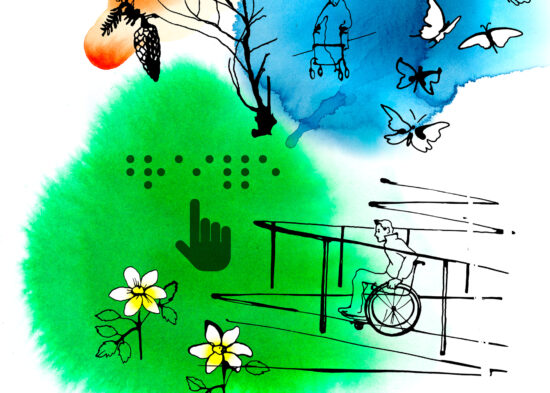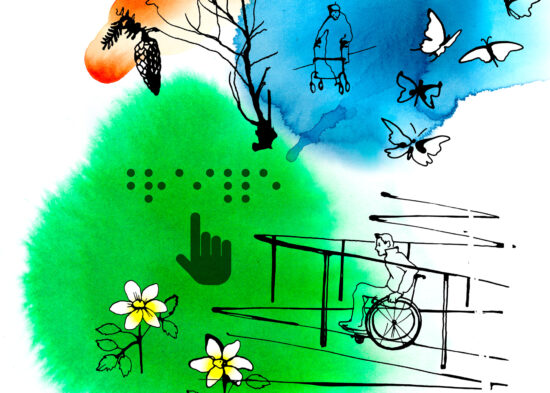Results from the project
Access to Nature for Persons with Disabilities: Perspectives and Practices of Swedish Tourism Providers
Access to Nature through Tourism : A Study of Four Perspectives on Inclusive Nature-based Tourism
BFUF Rapport #18 Naturligtvis – tillgänglig och inkluderande naturturism
Tillgänglighet i Jämtlandsfjällen – resultat från en studie om inkluderande naturturism och friluftsliv
Enhancing Accessibility in Tourism & Outdoor Recreation
BFUF Play
Naturligtvis
Cirka 20 procent av oss har funktionsnedsättning. Till det kommer alla som kanske är tillfälligt sjuka, skadade eller gravida. Naturturismföretag…
Sandra Wall-Reinius, PhD in Cultural Geography, Mid Sweden University/Etour
What is your research project about?
“Our plan is to identify areas that can be improved in order to increase accessibility to nature tourism. This means developed services and products with various types of disabilities. Ultimately, it’s about making sure that all individuals have the opportunity to engage in tourism and recreation in outdoor environments.”
Why have you chosen to research this topic?
“We have noticed that there is a lack of research within this area and we have also observed an increased level of interest from those who work with issues of accessibility and nature tourism on a practical level over the last few years. In addition, there is a number of projects being undertaken right now across the country’s municipalities which are related to making nature tourism accessible and which we hope to be able to collaborate with and benefit from.”
How will the project be carried out?
“We are going to collect data by conducting surveys with members of different organisations, such as DHR (Participation, Action, Movement), FUR (Association for Young People with Disabilities) and SRF (National Association for the Visually Impaired). Once the results have been collected, they will then be analysed in workshops together with our reference group, which consists of key actors and experts from public and private operations at a company, destination, regional and national level.
We are also going to investigate different destination types, such as mountain environments in Jämtland Härjedalen where we will follow a number of ongoing projects. For example, we will be looking at work on the creation of a national park in Jämtland, which is currently considering matters of accessibility and service. We are also going to study the skiing destination of Åre, which is a considerable tourist magnet in the area, and look at how it works with these kinds of issues. Together with our reference group, we will also identify destinations in wooded and coastal areas for study.
How will the hospitality industry benefit from the project?
“We hope that the project will help the Swedish nature tourism industry to become stronger and more competitive. Better awareness about the needs and desires of persons with different kinds of disabilities and identifying good examples can contribute to the development of completely new services and products. We have seen that there is a need for greater collaboration between the public sector and private companies when it comes to improving accessibility and the lessons that we will learn through this project will help contribute towards this. The project is also right on target in order for Sweden to meet the goals set by the UN on the rights of persons with functional variations.”
What challenges will you have to face?
“One challenge will be how we design the survey. We need to be particularly careful with regards to ethical considerations when asking our questions. Another challenge will be having to say no. There is a lot of interest in the project from multiple directions, which is really great, but we will be working to a rather limited timeframe.
Participating researchers and project team
Sandra Wall-Reinius, PhD in Cultural Geography (project manager), Dimitri Ioannides, professor in Cultural Geography, Kristin Godtman Kling, PhD candidate in Tourism Studies and Sandra Wåger, communicator.
Reference group
The Swedish Agency for Participation (MFD), the DHR (Participation, Action, Movement) organisation and Jämtland Härjedalen Tourism. The reference group will be expanded over the course of the project to also include companies, municipalities and other public actors within tourism, nature and the protection of natural environments.
Project facts
Project
Accessible and Inclusive Nature Tourism: Good Examples of Universally Designed Products
Research organization
Mid Sweden University/ETOUR (European Tourism Research Institute)
Project Manager
Sandra Wall-Reinius
Members
Dimitri Ioannides, Kristin Godtman Kling and Sandra Wåger
Period
2019 Feb – 2021 Jan
Amount
SEK 1,400,000






